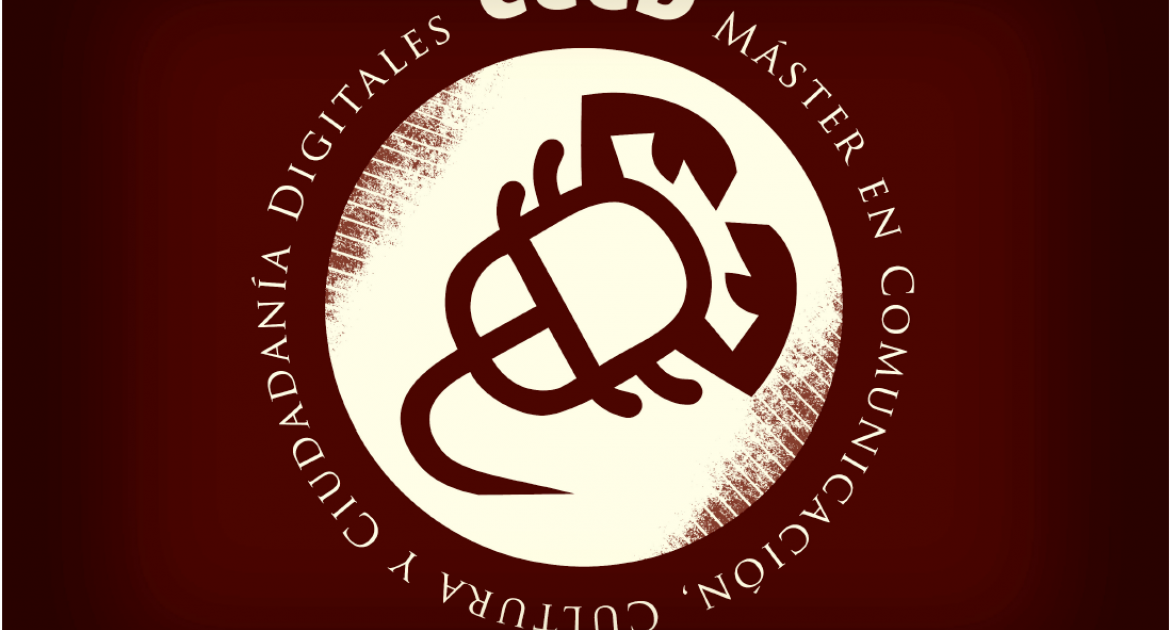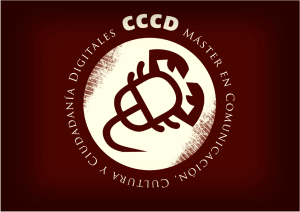Master’s Degree in Communication, Culture and Digital Citizenship (CCCD)

> Presentation
> Learning itinerary
> Admission and registration
> Faculty
> FAQ

Presentation
The Master's Degree in Digital Communication, Culture and Digital Citizenship offered by the URJC in collaboration with Medialab-Prado is based on the following principles:
1.- Combining theoretical and practical knowledge, focusing on the development of the project-prototype which students must present to be admitted. This work constitutes the main axis to which the different seminars will be connected. It will be tutored from the start and may be centred on theoretical debates as well as digital applications for carrying them out.
We thus dilute the border between professional and academic postgraduate degrees. We add descriptive, analytical, critical and propositional contents with the possibility of developing technical skills to put them into practice.
2.- CCCD deals with digital communication, cultures and citizenship, emphasizing their open and collaborative nature. That explains our commitment to the presentation of free access knowledge, as a contribution to social knowledge, and a collaborative pedagogy restricted to those registered who want to attain academic credit. That collaboration takes place on-site and online, through answering questions, offering additional information and helping to incorporate new knowledge to the project-prototype developed by each student. Collaboration is fostered among teachers and students and also among the community of those registered for the Master’s degree and related networks at MediaLab Prado, as well the faculty involved. The evaluation will take very much into account the inclusion of new elements and open collaborative practices in the development of the project-prototype.
3.- Pedagogical interaction will be completed with three on-site meetings at the MediaLab Prado venue, with the participation of all faculty and students. The first will be at the start of the course, lasting for two full days, devoted to presenting the project-prototype and establishing connections and common work lines. The second meeting will also last for two days, held halfway through the program to monitor progress on works and redirect them. The third and final meeting will last for three days, devoted to presentations of and public comments on the project-prototypes carried out over the year.
More information: José Manuel Sánchez Duarte josemanuel.sanchez(at)urjc.es
Video on the main guidelines for the Master’s degree (17.04.2012)
Learning itinerary
Subject Semester Type Number ECTS Digital methods for social research (I and II) [pdf] [video]1st and 2nd Obligatory 9 Social theory on new technologies and the Internet [pdf] [video]
1st Obligatory 6 Network communities: Cooperative management on the Internet [pdf] [video]
1st Obligatory 6 Public digital sphere [pdf] [video]
2nd Obligatory 6 Techno-citizenship and the Commons [pdf] [video]
2nd Obligatory 6 Journalism and digital media [pdf] 2nd Obligatory 6 Netartivism [pdf] [video] 2nd Obligatory 6 Practicum (Medialab workshops) 1st and 2nd Obligatory 3
Final project for the Master's degree
1st and 2nd Obligatory 12
The proposed itinerary recognizes the centrality of methodology to achieve empirical knowledge of the digital environment, thus avoiding clichéd technological dreams or nightmares. The largest number of credits will be concentrated on methodology and distributed throughout the calendar in two seminars to accompany creating the project. The seminar on social theory reviews social discourses generated historically about technology, focusing on new profiles that reflect the forms of contemporary subjectivity (individuals) and sociability. To learn about new social agents, we will approach network communities as nodes of cooperative management. We aim to show the dynamics and dilemmas faced by those who wish to be networked agents. The public digital sphere is the space where those communities interact. The objective lies in becoming aware of the degree of centrality held by digital initiatives proposed by students and their dependence on certain forms of expression of public opinion, which have changed radically. Those who act with higher degrees of autonomy on the web can be considered techno-citizens and results of their activities as the Commons. We will discuss these concepts and move on to more applied reflections on emerging forms of journalism and aestheticization processes of public discourse, connected to the thread of a supposed de-politicization of political communication. New practices and communicative roles will be analyzed in connection with intervention processes in the public sphere.
The practicums consist of taking and participating in the seminars scheduled by MediaLab Prado of each student's choice, as per profile and project. For the 2012-13 academic year, examples of such workshops are the ones on data visualization, the Commons and hacking the city, or the one offered by Prof. Christopher M. Kelty.
Each seminar is structured in three phases that embody an interdisciplinary approach, the open and collaborative nature of CCCD. The first step consists of the presentation of each seminar’s conceptual maps and lines of debate. It will take the form of master classes given by the Master’s degree faculty in an open format: free access lectures at MediaLab Prado, broadcast via streaming and then saved online. The second step, restricted to registered students who want to obtain the Masters degree (and subsequently an official doctorate, if that is the case), consists in clarification, debate and bibliographic extension of the master classes via a digital forum. The third step involves personal on-site tutorials with professors, so they can justify students’ presence in their seminars and help students apply them to their specific project.
In addition to master classes, each seminar also includes sessions with guests from professional or practical fields, as well as case studies, most of them currently in progress. Some will be included in various seminars to give greater coherence, e.g. 15M, Wikileaks or Wikipedia. Others will include examples of professional practices, such as Gumersindo Lafuente (El País) and Pau Llop (Bottup, Fixmedia) in digital journalism or The Yes Men in artivism.
This itinerary is framed by three on-site sessions in which all the faculty and students present, debate and collaborate on the start, development and presentation of projects.
Video presentation of the Master’s degree (17.04.2012)
Admission and registration:
Students interested in the Master’s degree must present (in addition to their C.V.) a project to be developed during the course. The project must comprise:1) Objectives
2) Justification
3) Working timeline
4) Define an interest area and possible tutors (in relation to the Master’s degree faculty) including several options (see Faculty)
Projects will be selected according to the following criteria: quality, technical feasibility, clarity of the proposal, concurrence of various fields of knowledge and theoretical-practical approaches, openness to collaboration, using open source tools and licenses which facilitate free access to processes and results.
Students whose projects have been selected will be called for a personal interview to be held with a committee presided by the director of the Master’s degree. See Pre-registration
Faculty:
Víctor Sampedro (Communication, URJC)Areas of interest: Public sphere and opinion theory, new technologies and social movements, emerging communication media, open-data and transparency.
Projects in progress: Techno-politics in elections: www.ciberdemocracia.es; conventional and digital journalism, digital mobilization (15M, Wikileaks...), Citizen control of political management and representation.
Adolfo Estalella (Anthropology, CSIC)
Areas of interest: Urban studies, free culture, social studies of science and technology, digital humanities
Projects in progress: prototypes, open urban forms, hacking the academy (social research methodology), Empiria Digital (digital humanities)
José Manuel Sánchez Duarte (Communication, URJC)
Areas of interest: Political communication, social networks and political participation
Projects in progress: Techno-politics in elections: www.ciberdemocracia.es; new forms of network political participation.
Ángel Gordo (Sociology, UCM)
Areas of interest: Technology and social change; research methodology (qualitative methods); material culture: social mobility; self mobility cultures; Agro-ecology.
Projects in progress: (i) Young people and social technologies in the framework of unequal "development" in Spain’s information society: social structures and technological distinctions; (ii) Learning transitions in the Internet Age: from plagiarism to collaborative knowledge; (iii) self mobility cultures
Amparo Lasén (Sociology, UCM)
Areas of interest: ICT uses, presence, and mediation, subjectivities, emotions and feelings, technological mediation of mobilizations and participation forms, music, technology and listening.
Projects in progress: Self-photos and Self-pornification; Methodological Innovations for Emerging Practices: Controversies and Unrest Related to the Public/Private Spheres.
Igor Sádaba (Sociology, UCM)
Areas of interest: sociology of technology, social representations of technology, methodologies of social research, methodological innovations and online social research, social change and technology.
Projects in progress: (i) Young people and social technologies in the framework of unequal "development" in Spain’s information society: social structures and technological distinctions; (ii) Learning transitions in the Internet Age: from plagiarism to collaborative knowledge; (iii) Digital social networks.
Jesús González Barahona (Computer Science, URJC)
Areas of interest: Free software development, communities of collaborative innovation and production, production of free works.
Projects in progress: ALERT Active Support and Real-Time Coordination Based on Event Processing in Floss Development); SobreSale (analysis of error resolution patterns in software development communities); Quantitative reports on free software development projects; Study of the development of Wikipedia based on information available in its repositories.
Andoni Alonso (Philosophy of Science, UCM)
Areas of interest: philosophy of technology, adoption, technology appropriation and empowerment, open science, open technology.
Projects in progress: hidden social innovation, knowledge and open science communities (Ministerio de Educación y Ciencia).
Alberto Corsín (Anthropology, CSIC)
Areas of interest: Anthropology of experimentation; prototypes; ethnographies of "hacking" (from the web, toward the city).
Projects in progress: City, spaces, prototypes: open urban forms
Antonio Lafuente (History of Science, CSIC)
David Domingo (Online Journalism, URV)
Areas of interest: Digital journalism, technological innovation processes, active audiences, journalism and democracy, crowdsourcing and crowdfunding, citizen journalism
Projects in progress: news production at Spanish digital news desks/ audience participation management on digital newspapers/strategies for transparency in journalism in Europe, the USA and Arab countries.
Tíscar Lara (EOI-School of Industrial Organization)
Areas of interest: data journalism, MOOC in higher education, free culture, mobile learning, open knowledge, social web, media literacy, audiovisual commons & digital identity
Projects in progress: Mobile learning and open knowledge at EOI / Twitter analysis of the 20N campaign / MOOC courses at Venture Lab / RePlay Hemeroteca Audiovisual Procomún
Jordi Claramonte (Aesthetics, UNED)
Areas of interest: Political and context art, modal aesthetics and language games, Westerns and film noir, Lukács, Hartmann and Karl Kerenyi.
Projects: Aesthetics and Politics of the Commons Database on Aesthetics and Art Theory HUM2007-574032 CSA La Tabacalera.
Gloria Durán (Anthropology-Aesthetics, UNED)
Areas of interest: Ethnographies in the field of public art, the figure (Bild) of the artist as a specific virtue, honour and dignity as new paradigms of hacker ethics. www.gloriagduran.com
Projects in progress: Praticemad.net (CSO2009-10780): emerging cultural practices in the new Madrid-young people, urban cultures and digital networks. Madrid Cosmopolis: emerging metropolitan practices and processes, CSA La Tabacalera
Preguntas frecuentes
Must an entry test be passed?
Yes. You must present a project and attend an interview.
How many school years and credits comprise the degree programme?
One academic year with courses for 60 ECTS.
What is the cost?
Price will be set by the Madrid Regional Government’s Education Department.
Where will classes be held?
At MEDIALAB-PRADO, Plaza de las Letras. C/ Alameda, 15 · 28014 Madrid (Spain).
See location
Who should I contact to request information about the Master's Degree?
José Manuel Sánchez Duarte (Coordinator of the Master’s Degree) josemanuel.sanchez(at)urjc.es




 Medialab-Matadero Madrid
Medialab-Matadero Madrid